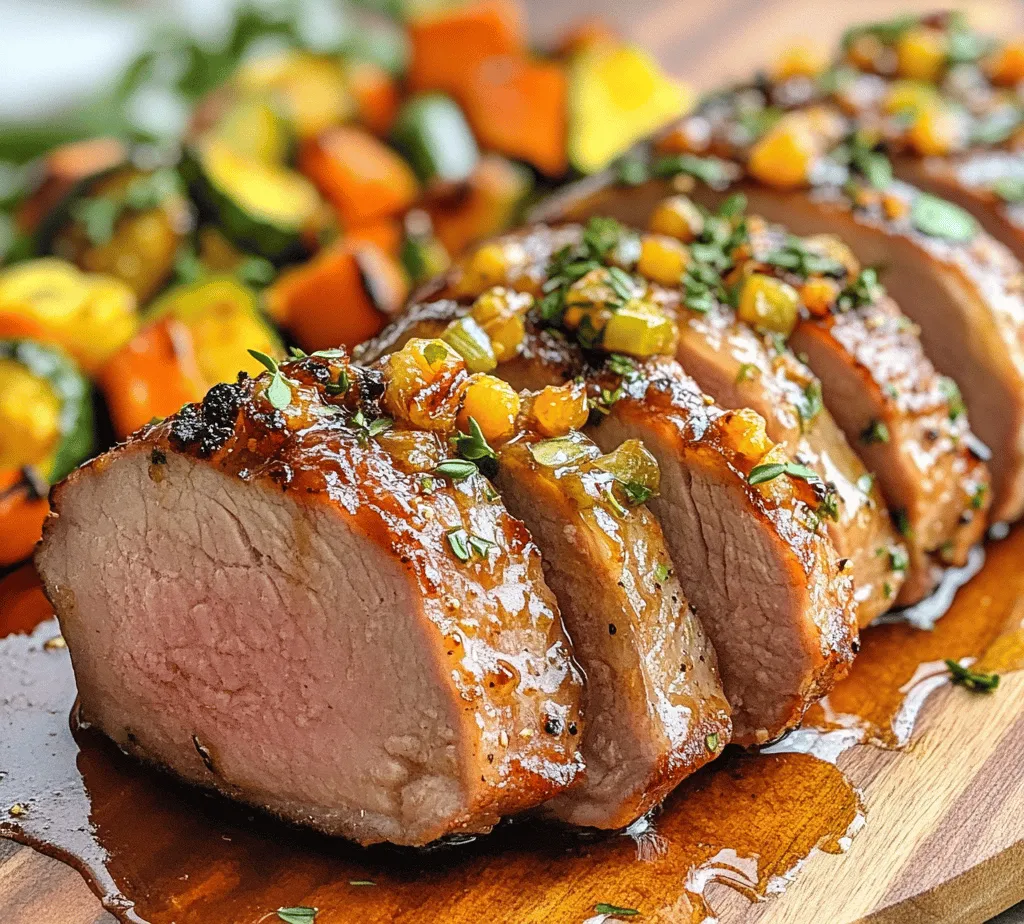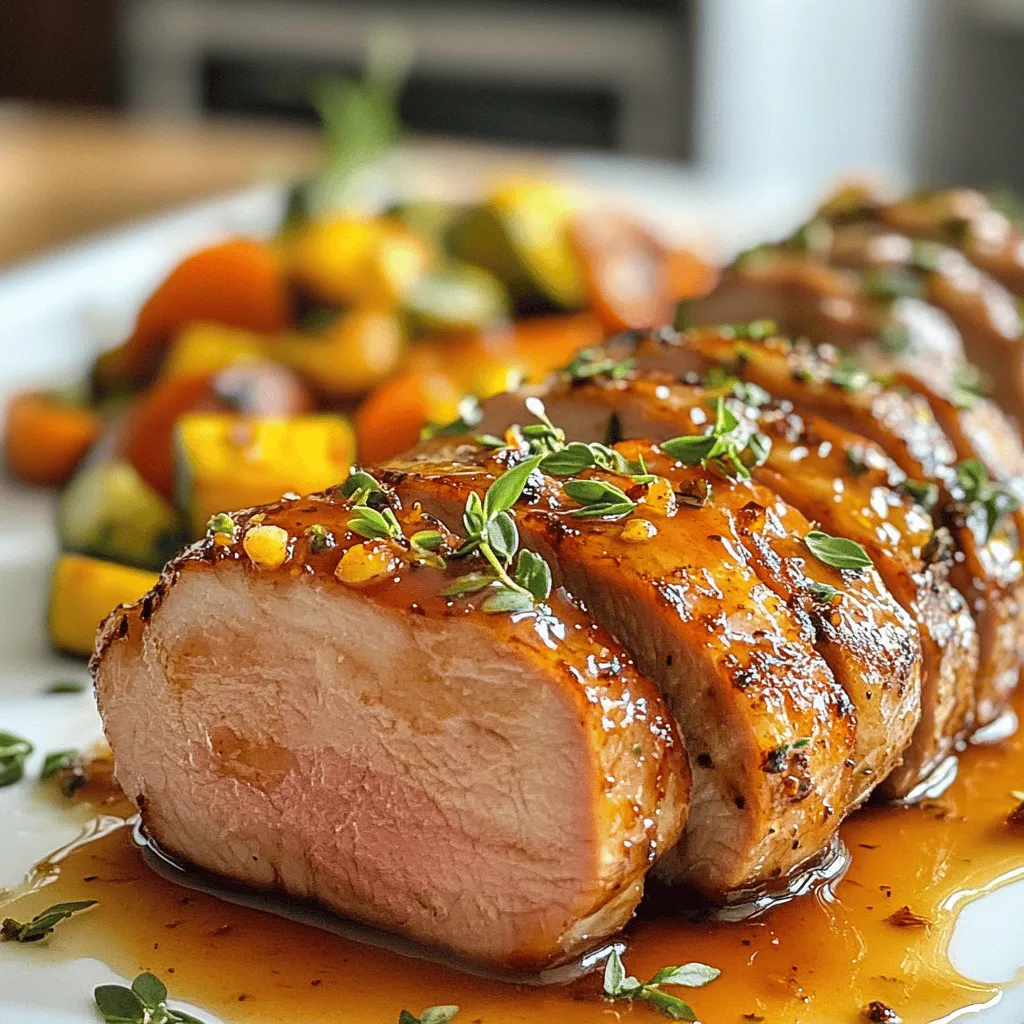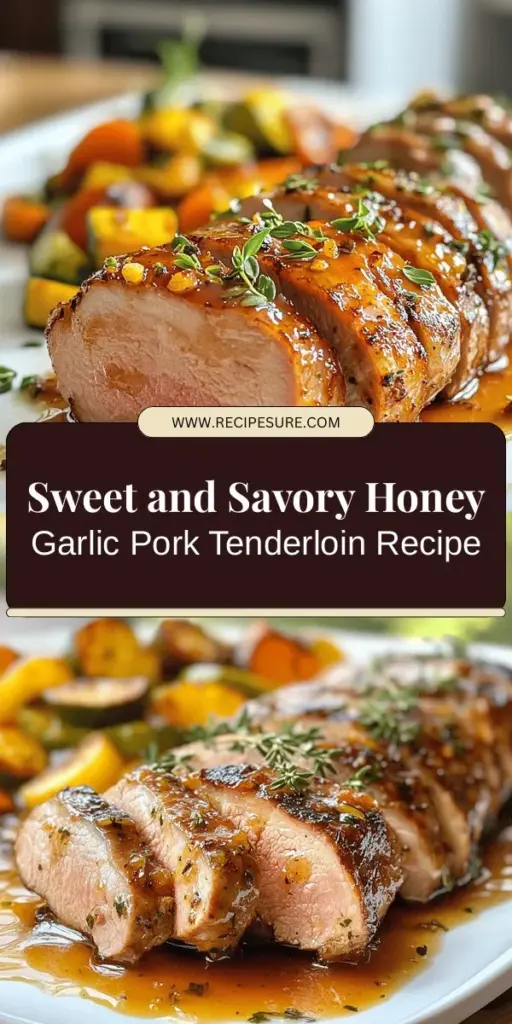Introduction
Are you looking for a dish that tantalizes your taste buds with a perfect blend of sweet and savory flavors? Look no further than the Honey Garlic Pork Tenderloin. This recipe is a culinary delight that combines the rich, succulent taste of pork tenderloin with the irresistible sweetness of honey and the boldness of garlic. The appeal of this dish lies not only in its mouthwatering flavor profile but also in its ease of preparation, making it an ideal choice for both weeknight dinners and special occasions.
In cooking, the balance of flavors is paramount. The sweetness of honey beautifully complements the savory, umami-rich soy sauce, while fresh garlic adds depth and aroma. Together, these ingredients create a harmonious blend that elevates the humble pork tenderloin to extraordinary heights. Not only is this dish flavorful, but it also exemplifies the versatility of pork tenderloin, allowing for a variety of cooking methods—from roasting and grilling to pan-searing.
Beyond its taste and versatility, the health benefits of the ingredients used in this recipe make it an even more appealing choice. Pork tenderloin is a lean cut of meat, low in fat and high in protein, while honey offers natural sweetness and antioxidants. Garlic, known for its numerous health benefits, adds not only flavor but also nutritional value. The combination of these ingredients results in a dish that is both satisfying and nourishing.
Understanding Pork Tenderloin
Pork tenderloin is a prized cut of meat that comes from the muscle that runs alongside the backbone of the pig. This cut is renowned for its tenderness and mild flavor, making it a favorite among home cooks and professional chefs alike. Unlike other cuts of pork, pork tenderloin is very lean and does not require extensive cooking time, which makes it an excellent choice for quick weeknight meals or elegant dinner parties.
In terms of nutrition, pork tenderloin is a powerhouse of protein, containing approximately 22 grams of protein per 3-ounce serving. It is also low in calories, with just around 120 calories per serving, and contains essential vitamins and minerals, including B vitamins, zinc, and phosphorus. These attributes make pork tenderloin a healthy option for those looking to incorporate lean protein into their diets.
The popularity of pork tenderloin in home cooking can be attributed to its adaptability. It absorbs flavors well, making it perfect for marinades and seasonings. Whether you’re grilling, roasting, or stir-frying, pork tenderloin can be the star of your meal, offering endless possibilities for delicious dishes.
The Allure of Honey Garlic Flavors
The flavor profile created by honey, garlic, and soy sauce is nothing short of magical. Honey brings natural sweetness to the dish, balancing the saltiness of the soy sauce and the pungency of garlic. This trifecta of flavors enhances the overall taste experience, resulting in a dish that is both comforting and exciting.
Culturally, honey garlic dishes have made their mark in various cuisines worldwide. From Asian-inspired recipes to Western favorites, the harmonious blend of sweet and savory is a culinary theme that transcends borders. The versatility of honey garlic marinades allows for creativity in the kitchen, enabling cooks to experiment with different proteins and vegetables while still achieving that beloved flavor combination.
Utilizing natural sweeteners like honey in cooking not only contributes to better flavor but also offers health benefits. Honey is rich in antioxidants and has antimicrobial properties, making it a healthier alternative to refined sugars. Its unique flavor can also vary greatly depending on the type of flowers from which the nectar is collected, allowing for a delightful range of tastes in your dishes.
Ingredients Breakdown
To prepare the Honey Garlic Pork Tenderloin, you’ll need a selection of fresh, high-quality ingredients. Here’s a detailed breakdown of each component:
Pork Tenderloin
When selecting pork tenderloin at the store, look for a cut that is pinkish-red in color with minimal marbling. The meat should feel firm to the touch and should not have an off-putting smell. Handling is crucial; be sure to keep the pork refrigerated until you are ready to cook it to maintain its freshness.
Honey
The type of honey you choose can significantly affect the flavor of your dish. For a mild sweetness, clover honey is a great choice. If you prefer something more robust, consider using wildflower or buckwheat honey, which have deeper flavors. Keep in mind that raw honey retains more nutrients and flavor characteristics compared to processed honey.
Soy Sauce
Soy sauce is a staple in many kitchens and comes in various types, including regular, low-sodium, and tamari (gluten-free). Low-sodium soy sauce can be a healthier option if you’re watching your sodium intake. The choice of soy sauce will impact the overall flavor of the marinade, so select one that aligns with your taste preferences.
Garlic
Fresh garlic is essential for this recipe. It packs a punch of flavor that pre-minced or powdered garlic simply cannot replicate. When using fresh garlic, aim to choose bulbs that are firm and have tight, unblemished skins. The more garlic you use, the more robust the flavor, so feel free to adjust according to your taste.
Apple Cider Vinegar
Apple cider vinegar adds a tangy brightness to the marinade and helps to tenderize the meat. It is also known for its health benefits, including aiding digestion and possessing anti-inflammatory properties. Look for organic, unfiltered varieties for the best flavor and health benefits.
Olive Oil
When cooking with olive oil, quality matters. Extra virgin olive oil is the best choice for drizzling and marinades due to its rich flavor and health benefits. If you’re cooking at high temperatures, consider using a refined olive oil or avocado oil, which have higher smoke points.
Ground Ginger
Ground ginger adds warmth and a hint of spice to the marinade. It also contributes health benefits, such as aiding digestion and possessing anti-inflammatory properties. Fresh ginger can be used as well, but if you opt for ground ginger, ensure it’s stored properly to maintain its potency.
Black Pepper and Red Pepper Flakes
Black pepper adds a mild heat and complexity to the dish, while red pepper flakes can be adjusted to suit your spice preference. If you enjoy a little extra kick, feel free to increase the amount of red pepper flakes in the marinade.
Fresh Herbs
To elevate your dish further, consider garnishing with fresh herbs such as cilantro, parsley, or green onions. These herbs not only add a pop of color but also freshen up the flavor profile of the dish.
Step-by-Step Cooking Instructions
Preparing the Marinade
To create the marinade for the Honey Garlic Pork Tenderloin, start by measuring out all the ingredients. In a mixing bowl, combine the honey, soy sauce, minced garlic, apple cider vinegar, olive oil, ground ginger, black pepper, and red pepper flakes. Whisk the ingredients together until they are fully incorporated and the honey is dissolved.
The importance of mixing the ingredients thoroughly cannot be overstated. A well-blended marinade ensures that every bite of the pork tenderloin is infused with the delightful combination of sweet and savory flavors. Once your marinade is ready, set aside a portion to use as a glaze during cooking, and place the pork tenderloin in the remaining marinade. Cover and refrigerate, allowing the flavors to penetrate the meat for at least 30 minutes or up to overnight for the best results.
This step is crucial as it not only enhances the flavor of the pork but also helps to tenderize the meat, resulting in a juicy and flavorful dish. As the pork marinates, you can prepare any sides you wish to serve alongside, such as roasted vegetables or a fresh salad, to complement the rich flavors of the Honey Garlic Pork Tenderloin.
Stay tuned for the next part of this article, where we will dive into the cooking methods and tips for achieving the perfect Honey Garlic Pork Tenderloin!

Tips for Achieving the Best Flavor Infusion
To ensure that your Honey Garlic Pork Tenderloin is packed with flavor, the marination process is crucial. Here are some tips to enhance the infusion of flavors into the pork:
- Use Fresh Ingredients: Fresh garlic and ginger will yield a more vibrant flavor than their dried counterparts. If possible, opt for organic honey for a richer taste.
- Cut the Pork: If you have time, consider scoring the pork tenderloin lightly with a sharp knife. This technique allows the marinade to penetrate deeper into the meat.
- Massage the Marinade: After you combine the ingredients for your marinade, pour it over the pork and massage it into the meat. This helps to ensure that every inch of the tenderloin is coated and infused with flavor.
- Use an Air-tight Container: When marinating, use a zip-top bag or a glass container with a lid. This prevents leakage and allows the marinade to circulate around the meat.
Marinating the Pork
Marinating is an essential step that adds depth to the flavor of your Honey Garlic Pork Tenderloin. Here’s how to do it effectively:
1. Prepare the Marinade: Combine honey, soy sauce, minced garlic, grated ginger, and black pepper in a bowl. Whisk together until well blended.
2. Marinate the Pork: Place the pork tenderloin in your chosen container and pour the marinade over the meat. Ensure it is fully submerged.
3. Refrigerate: Seal the container and store it in the refrigerator. The longer you marinate, the more intense the flavor will be.
Recommended Marinating Times for Optimal Flavor Absorption
For the best results, consider the following marinating times:
- Minimum Time: At least 30 minutes will infuse a decent amount of flavor.
- Ideal Time: 2 to 4 hours is generally recommended for the best flavor.
- Overnight: If you wish to prepare in advance, marinating the pork overnight can yield incredible results, but be cautious not to exceed 24 hours, as the texture may become overly mushy.
Safe Handling and Storage of Marinated Meat
When handling marinated meat, food safety is paramount:
- Keep it Cold: Always marinate your pork in the refrigerator to prevent bacterial growth.
- Avoid Cross-Contamination: Use separate utensils and cutting boards for raw meat and other ingredients.
- Store Properly: If you have leftover marinade, do not reuse it unless you boil it first to eliminate any bacteria from the raw meat. Store marinated pork in the fridge for up to 2 days before cooking.
Preheating the Oven
Proper oven temperature is critical for cooking meat evenly:
1. Set the Temperature: Preheat your oven to 400°F (200°C). This high heat allows for a nice sear on the outside while keeping the inside juicy.
2. Be Patient: Allow your oven to fully preheat before placing the pork inside. This ensures that the cooking process starts immediately, which is vital for maintaining the pork’s moisture.
Searing the Pork
Searing is a technique that adds flavor and texture to your dish:
- Choose the Right Pan: Use a heavy-bottom skillet, preferably cast iron or stainless steel, to ensure even heat distribution.
- Heat the Skillet: Preheat your skillet over medium-high heat until it’s hot enough. You can test this by sprinkling a drop of water on the surface; if it sizzles and evaporates quickly, your pan is ready.
- Add Oil: Add a tablespoon of oil (olive or vegetable) to the hot skillet. Swirl it around to coat the bottom.
- Sear the Pork: Place the marinated pork tenderloin in the skillet. Do not move it for at least 3-4 minutes to allow a golden crust to form. Turn it to sear all sides evenly.
Baking the Pork
After searing, it’s time to finish cooking in the oven:
1. Transfer to the Oven: Once the pork is beautifully browned, transfer the skillet directly to the preheated oven. If your skillet is not oven-safe, place the pork in a baking dish.
2. Monitor Internal Temperature: Use a meat thermometer to check the internal temperature of the pork. The USDA recommends cooking pork tenderloin to an internal temperature of 145°F (63°C) for optimal juiciness and safety.
3. Tip for Accuracy: Insert the thermometer into the thickest part of the meat, avoiding any fat or bone for the most accurate reading.
Resting the Pork
Resting is a critical step often overlooked:
- Why Resting is Important: Allowing your pork to rest for at least 5-10 minutes after cooking helps the juices redistribute throughout the meat, preventing them from running out when sliced.
- How Resting Affects Juiciness and Texture: This process makes the pork tender and juicy, ensuring each bite is flavorful and moist. Cover the resting pork loosely with foil to keep it warm.
Preparing the Glaze
A delicious glaze elevates the dish:
1. Reduce the Marinade: After removing the pork from the oven, pour the leftover marinade into a saucepan. Bring it to a boil over medium-high heat.
2. Boil to Eliminate Bacteria: Allow the marinade to boil for at least 5 minutes to ensure it is safe for consumption.
3. Thicken the Glaze: Let it simmer until it reduces and thickens into a syrupy consistency, which will enhance the flavor of your pork when drizzled over it.
Serving Suggestions
To create a complete meal, consider these serving ideas:
- Side Dishes: Pair your Honey Garlic Pork Tenderloin with steamed vegetables, roasted potatoes, or rice for a well-rounded meal. A fresh salad or coleslaw offers a refreshing contrast.
- Presentation Tips: Slice the pork tenderloin into medallions and arrange them on a platter. Drizzle the glaze over the top and garnish with chopped green onions or sesame seeds for a pop of color.
Nutritional Information
Understanding the nutritional value can help you enjoy this dish mindfully:
- Calories: Approximately 280 calories per serving.
- Protein: Each serving contains about 30g of protein, making it a great option for muscle maintenance and repair.
- Fats: With around 10g of fat, this recipe balances flavor and health.
- Carbohydrates: The dish has roughly 20g of carbohydrates, primarily from honey and any accompanying sides.
Health Benefits
This dish is not only delicious but also packed with health benefits:
- Lean Protein: Pork tenderloin is a lean cut, making it a healthier option compared to other meats.
- Vitamins and Minerals: Pork is a good source of B vitamins, selenium, and zinc, contributing to overall health.
- Dietary Considerations: This recipe can be made gluten-free by substituting soy sauce with tamari. For low-carb options, serve with non-starchy vegetables like zucchini noodles or cauliflower rice.
Conclusion
The Honey Garlic Pork Tenderloin is a delightful dish that blends sweet and savory flavors, making it perfect for family dinners or special occasions. With simple ingredients and straightforward preparation steps, this recipe showcases the joy of cooking with wholesome foods. The combination of marinating, searing, and glazing ensures that every bite is tender, juicy, and bursting with flavor.
We encourage you to try this recipe at home and experience the satisfaction of creating a delicious meal. Cooking can be a joyful process, especially when you use fresh, quality ingredients. Embrace the art of cooking and enjoy sharing this flavorful dish with your loved ones!


